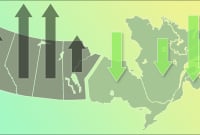Support strong Canadian climate journalism for 2025
When wildfires and floods arrive at a community’s doorstep, residents need information to know how to act. But what happens when cell service and the internet are down?
Niki Ashton, NDP MP of a northern Manitoba riding, posed that question to the Liberal government during Question Period on Tuesday. She called for telecommunication backups during climate emergencies such as severe wildfires.
Ashton’s remarks follow a wave of wildfire evacuations that recently hit her riding of Churchill—Keewatinook Aski over the past two weeks. Last week, the city of Flin Flon was without internet or cell service for days after wildfires burned through fibre optic and telecom lines, leaving residents, the hospital and other major services in the dark.
“The truth is there needs to be backups in place,” Ashton said in Parliament. “Let’s be clear, we need plans to deal with the catastrophic effects of climate change.”
Ashton is calling on the federal government to use its jurisdiction over telecommunications companies to ensure critical infrastructure plans are in place for communities during climate emergencies, particularly in areas prone to climate catastrophes.
Wildfires can intensify within minutes depending on wind and weather conditions. Downed communication lines can complicate evacuations, leaving communities to spread the word through door-to-door visits or local radio broadcasts, said Mike Westwick, a fire information officer for the Northwest Territories, in an interview last year.
Ottawa is speaking with telecommunication companies to set up a long-term solution for climate emergencies, replied Harjit Sajjan, Minister for Emergency Preparedness, during Question Period.
Over the past two weeks, wildfires have threatened several towns in northern Manitoba, including Cranberry Portage and the surrounding area. Over 500 people were evacuated from the region, but have since returned home in recent days.
There are currently 26 uncontrolled fires burning in Canada, with around 3,300 square kilometres burned in Canada so far, according to the federal government’s recent wildfire situation report.
Fires are still burning near Fort McMurray in Alberta and Fort Nelson in British Columbia. Residents of Fort McMurray have just begun to return home, while a handful of structures were lost in Fort Nelson over the weekend.
— with files from Pippa Norman and the Canadian Press
Matteo Cimellaro / Canada’s National Observer / Local Journalism Initiative







Comments
On paper, a telecom backup plan sounds good, but keep in mind who is going to pay for a backup that may only be needed once or not at all in a year. Our telecom bills are already the most expensive in the world and adding a backup will only result in higher telecom bills for consumers.
We already have an emergency broadcast system and people should be encouraged to have an emergency radio that operates by batteries or solar or crank power. They are not expensive to buy and bulky either. That would make far more sense than expecting cell service to be available.
With cell service today in areas outside of rural towns, service is already unreliable and spotty, but conventional radio service is available everywhere compared to cell service.
It would have to be something qualitatively different from the main telecom service--I mean, if you just have two fiberoptic cables, they can just both burn and you're back where you started. But for instance, there's satellite. Say you had a few big satellite dishes and some cell phone repeaters mounted on helicopters or something, not enough to cover your whole province, but you could rush them to a place where the service was out and have them take over from downed towers. I think there's possibilities, but you'd have to, you know, think about them and make a plan, like Niki Ashton is calling for.
I like Niki Ashton, she's a good person and pretty smart. She ran for leadership of the NDP once or twice and lost, and frankly I think she'd have been a poor leader because she's not a charismatic communicator, plus I don't think she has the instincts for fighting dirty. But she'd probably be a very effective cabinet minister.
Good for Ms. Ashton.
It's a useful exercise to see how, and to what extent, comms infrastructure (though not only comms), particularly for people outside of major centres. needs to be made more resilient to increasing risk of damage or interruption.